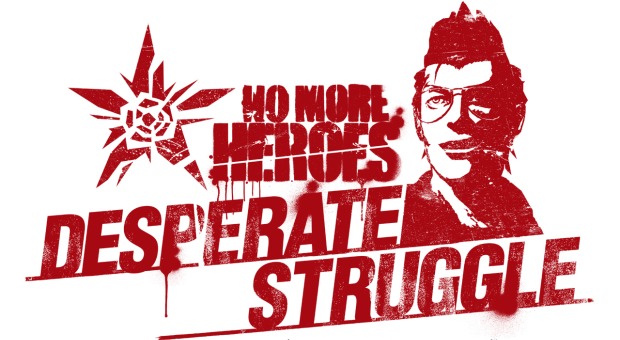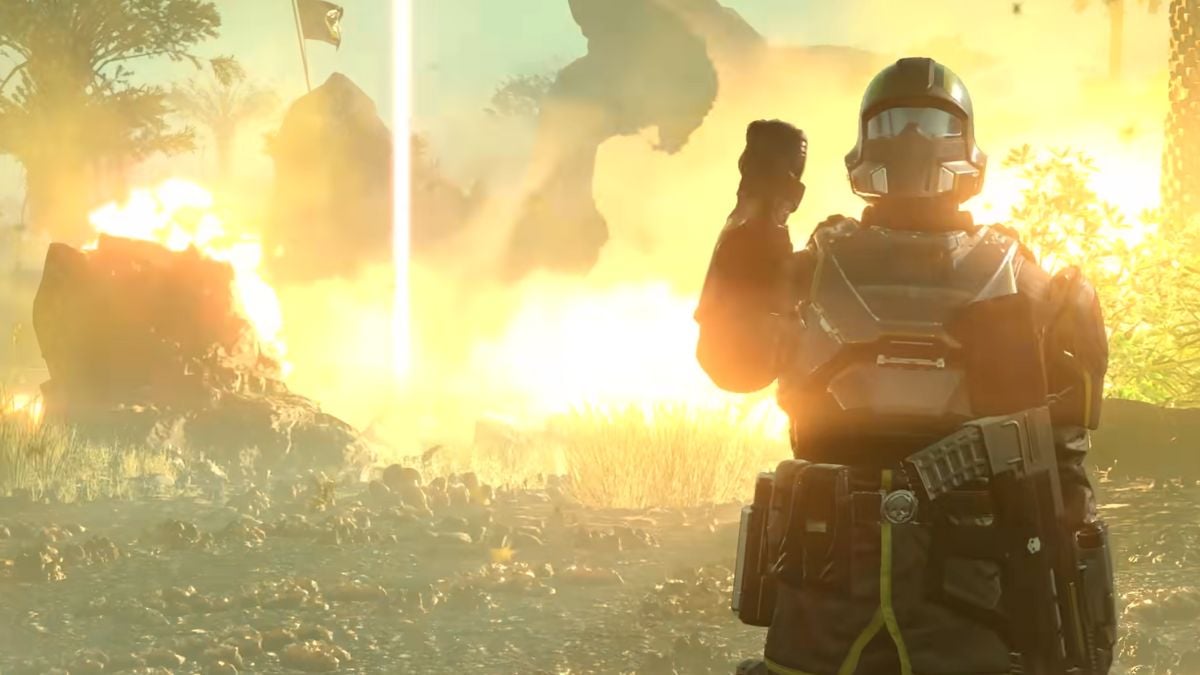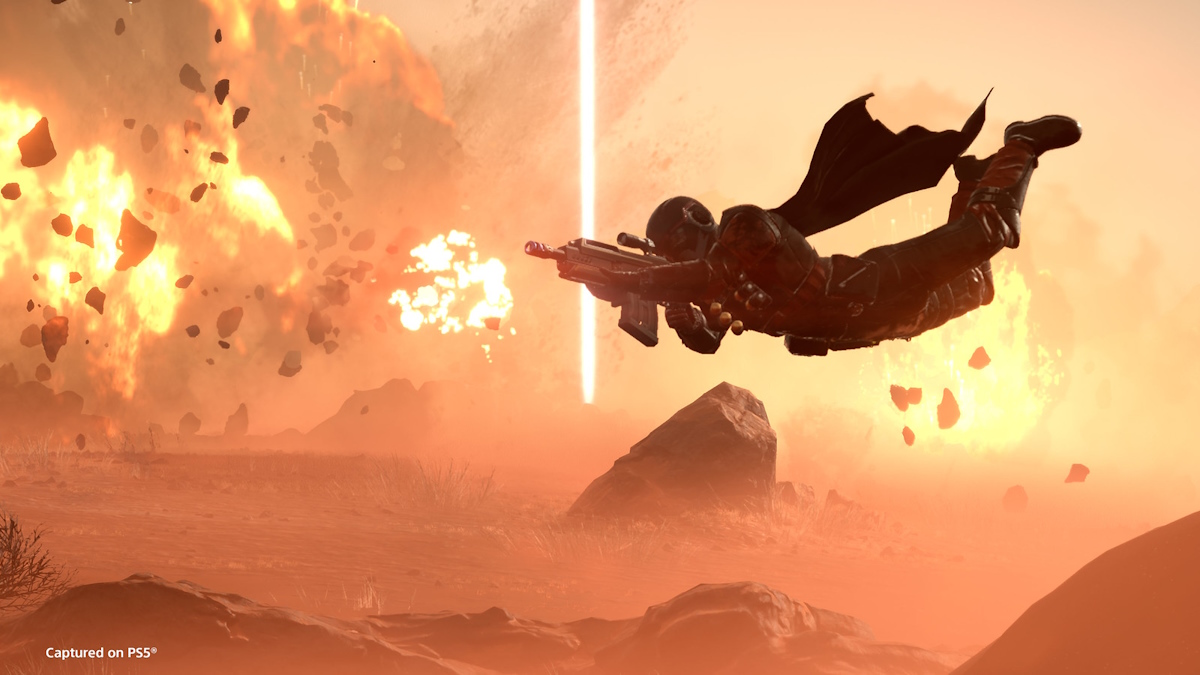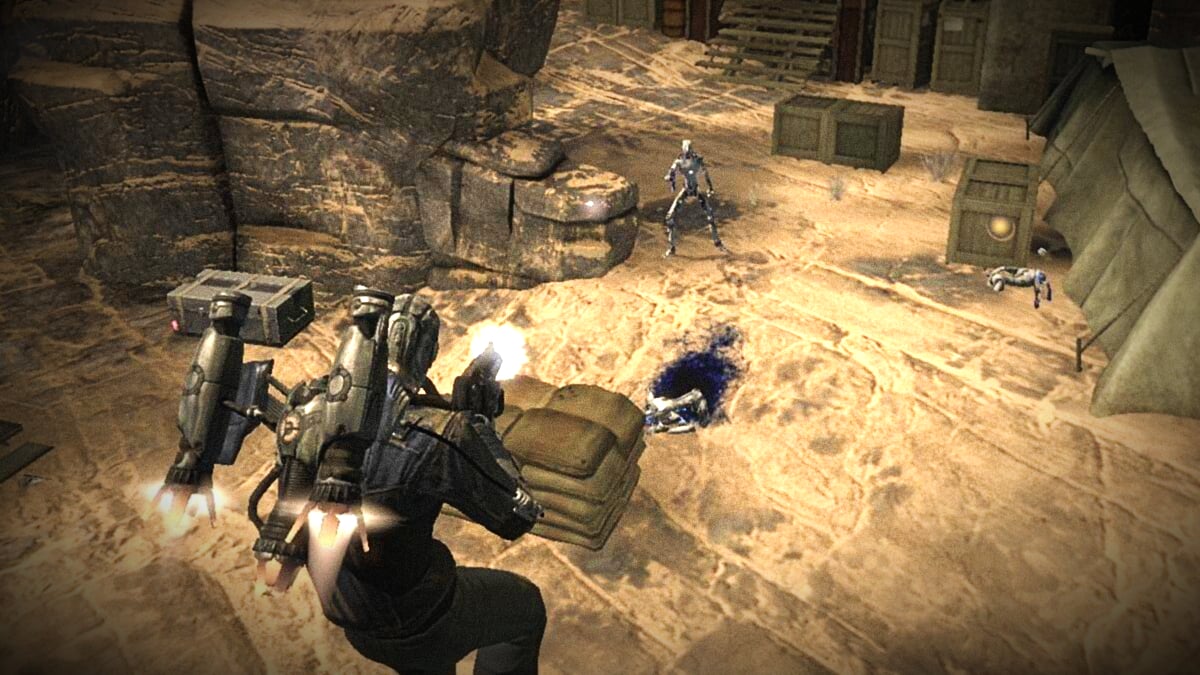Yesterday I began picking apart No More Heroes 2: Desperate Struggle to see what meaning I could derive from the game. For me the entire series speaks volumes about the world of gaming and analyzing it is a great way to get conversations going about gaming in general. It’s also a good way to have people tell me I’m over-analyzing stuff. But I like doing that, and I think that art needs to be discussed and analyzed and that we should share our differing opinions on what games mean to us. So I’m continuing on.
In the last post we discovered that the world of Desperate Struggle was indeed a representation of the current state of gaming, which lacks depth and is comprised of tired genres. Along with this Travis, Shinobu and Henry were also parts of the same character that represents the gamer. Up until these parts came together there was no real drive for Travis to change the style and events that were taking place. However, once Travis becomes whole (a true representation of what gamers are now) something changes. It’s this change that leads the game to get much more interesting.
Oh yes, and then there’s Sylvia. Read on to find out what the rest of No More Heroes 2: Desperate Struggle really means.

It’s pretty obvious to anyone who has played the game that the first half of the game’s bosses are strikingly different from the second half’s. In fact the feeling of the entire game is strikingly different in the second half. Whereas in the first half of the game the killings seemed fun and the bosses passed by like almost nothing, the second half’s bosses all have an impact on Travis and his world. This starts with Ryuji and escalates as the game continues.
As I mentioned in the previous post, both Shinobu and Henry are representations of other types of gamers than Travis, and Travis isn’t really complete until they’ve taken over his role for a while. This becomes even more apparent when we consider his battle with Ryuji. Ryuji is the first battle in the game that actually matters and it comes after Travis rejects Shinobu, in essence rejecting the new comer gamer and where he himself came from. Ryuji is a reminder of just that. With the thoughts of his interaction with Shinobu fresh on his mind Travis finally goes to do battle with an actual warrior, not one of the cut and paste assassins he’s been battling before.

Ryuji comes from Japan (most likely), which is the the birthplace of modern gaming. It’s also no coincidence that his name closely mirrors a fighter from one of the greatest fighting franchises of all time. He is so important because he is the past of gaming, and he reminds Travis of everything he learned about fighting and the world (gaming and the gaming world) in the first game and all the reasons Travis fell in love with the battle (or why we fell in love with gaming). While Ryuji opens with a bland mini-game-esque motorcylce battle he closes with the first real sword fight of the game. He’s a reminder of the challenge and experimentation that went on with in the early days of gaming. At the end of the fight is the first time Travis cares about another opponent and he begs Sylvia (we’re getting to her) not to destroy his body, though he eventually lets her anyway.
He doesn’t want Ryuji’s body destroyed because Ryuji is not a toss away boss like all the previous ones. Ryuji represents actual gaming, where we have come from, and getting rid of him would mean we would become stuck in the shallow world of gaming we are in now. Ryuji also helps Travis accept Shinobu by linking him back to his own past and reminding him that he came from the same place that she did. However, Ryuji does get destroyed as Travis does not stand up to Sylvia and lets her do her thing as he walks away. Travis isn’t strong enough yet, he needs Henry. He’s found his past, but he doesn’t know where he needs to go with it or why it is important and so he allows it to be destroyed. In turn many of us gamers have no clue about our past, especially younger generations who have not experienced the older games at all and have no desire to. Even when we do know our past it is impossible to know why older games are so important to how the gaming world will develop without knowing where we want that world to go. As it stands after Ryuji’s battle, Travis is where most hardcore gamers are now: knowing our past is important, but clueless as to why we need to keep it around.

Then Henry arrives. I’ve already discussed why he’s important so we’ll jump over it here, except to say that he’s the understanding that allows Travis to see why remembering the past and pushing for a new and different world are so important. In regards to the game, this means challenging the way the assassinations take place and the United Assassinations Associations rules and methods (more on them soon too). In the case of the metaphor, this means looking past the gloss of the fun, but shallow mini-games and genres and trying to push for games that really challenge the status quo. This brings us to the final four bosses, which I could analyze forever as well, but Tron did a lot of that already.
Margaret Moonlight, Captain Vladmir and Alice Twilight all represent different aspects of deeper and more thoughtful gaming. Travis remembers all of the, and in the case of Vladmir, actually stand up to Sylvia and does not let her destroy his body. For lengths sake I’m going to glaze over these three, except to point out that at the end of Alice Twilight’s battle is the only time Travis ever gets blood on himself. This is where full realization of what he is doing dawns on him and he (and you) can actually see the consequences of what he as been doing all this time. What follows is an epic blood covered speech bemoaning the fact that all these lives have been uselessly lost and the proclamation that it doesn’t matter that these people are assassins set up for fights by the UAA. They are still people and they can’t be treated like meat. The bosses should be respected, not tossed out one after another like cheap, knock-off games. This means that they can be more than just the fight, there can be more behind it if they’ll let there be and they’ll stop simply pumping out assassins (games) over and over.

But who is they? Say hello, to Sylvia and the UAA. Travis’ final speech is yelled at her and she’s the one who is setting up all the fights as well. If Travis is the gamer and Santa Destroy is the world of gaming then this means that Sylvia is the game creator. The director, the developer, the producer; whomever you believe is responsible for the final product that you play (I’m a fan of auteur theory as you can tell, so we’ll refer to her as the director). I will be the first to admit that I totally missed this in the first game and didn’t even discuss it in my pieces, but it fits really well in there too. The greater emphasis on Travis’ and Sylvia’s relationship brings it to the forefront in Desperate Struggle, however, and it’s a brilliant relationship. It also turns out that Sylvia is the one that stopped the battle between Henry and Travis. Something only the director of a game could do to two forever battling game characters or gamers.
Travis loves and hates Sylvia. She teases him with promises and often doesn’t deliver. She’s constantly insulting the game, telling us what do and do not need to know and she always seems out to screw Travis over. Yet Travis always comes back. He berates her over and over, tries to shun her when he realizes she’s feeding him crap and then shoveling it out of the way. At the same time he loves what he gets from her. He loves that she’s sexy and good looking and he’s strangely attracted to her inability to ever act the same way. As gamers we do the same thing. We’ve had crap shoveled at us and we’re drinking it up. The game industry shovels away the last game and presents us with a new one, and we gobble the repeat up again despite it often not challenging any of the norms or pushing any boundaries. We do it as blindly as Travis does his assassinations for the first half of the game.

Sylvia promises Travis sex as a reward if he wins, a promise never fulfilled in the first game, and when the second game begins one that seems to be a false hope. Even Travis knows this as he doesn’t commit to the fighting fully until his friend is killed (however trivial that murder is). The promise of the ultimate joy has gone flat on him, he knows she is just teasing. We as gamers are teased as well. We are promised the world if we keep on taking what they give us, but the world isn’t delivered. We always seem to be chasing that ultimate experience (here represented by sex), but it’s never given to us.
The message here though is that we aren’t demanding it. Travis is fine with the false hope and minuscule amount of motivation that he has to continue on his path. At least this is true for the first half of the game, which has barely any development between Travis and Sylvia (gamer and director) at all. She swoops in and delivers another challenge and you move on to it while a few cut-scenes have her teasing Travis with the big promise of sex. However, once Travis challenges her after becoming a whole gamer and being reminded of what is important, she suddenly starts to look at him in a different light. It’s clear to see respect developing and in the end she comes to Travis and they… well they fuck, to put it bluntly. It isn’t until Travis starts demanding more out of Sylvia and her organization that she realizes she hasn’t been giving him anything real. When the realization does hit (the last few boss battles) and Travis calls her on the difference she starts to realize she really hasn’t been delivering and she can’t just shovel him more and more battles because he knows better and deep down so does she.

Travis and and Sylvia’s fucking becomes less of an ultimate reward when it does happen and more of a final understanding and union between the two. The gamer and the director coming together to create a better understanding of what the two need. Of course this is represented in classic Travis fashion by him screaming “Downward Fucking Dog!” at the top of his lungs, but it is that exaltation that sums up very well what happens when a gamer and director (via his/her game) can actually come together and connect on a deeper level than just the developer shoveling out game after game to the gamer. It is with this understanding, that assassin and bookie (gamer and director) should work together, that Travis moves forward to do battle with his final opponent, Jasper Batt, Jr.
Batt, Jr. is the epitomy of what is wrong with the shiny Santa Destroy. He’s a weakling hiding behind the cover of his shiny toys that he attacks Travis with. Hell, he’s the one who built it into the empire Santa Destroy is now. Travis goes there to destroy that empire and end the UAA so that he and Sylvia can be together. The gamer, then is there to finally confront the one who has created this world of simplistic games and sequels. Travis has finally connected with the person in charge of the game’s rules and creation, he just needs to destroy the world it’s being played in so that he and Syliva can work together for a better future. If he can take down Batt Jr.’s world then he can build his own world (possibly something akin to the world of the first game) with Sylvia. I’m pretty sure any gamer out there would love the chance to construct their perfect gaming industry as well. Travis believes killing Batt Jr. will do this.
Unfortunately it doesn’t work like that. After defeating the first two incarnations of Batt, Jr. with the aid of Henry, Batt, Jr. returns in the most cliche of all boss battle cliches, the giant version of the original boss who tries to hit you with is hands. Henry, the educated gamer, is so off put by the mere site of such lazy design that he leaves Travis alone to finish the battle off not wanting to dirty himself with such a trite boss. Travis even rolls his eyes with annoyance and exclaims how predictable it all is. However, in his quest to make his world better he pushes forward; revenge, by the way, now a long forgotten memory since he’s found out that Batt, Jr. didn’t kill the people he really cares about (Henry, Sylvia and Shinobu). But what Travis finds is the same thing that he found in the last game. He can’t get out without dying himself. We can’t get out without quitting the game either, we have to turn it off and disconnect to keep moving forward to a better game.
And so in order to destroy Batt, Jr. Travis makes what he believes will be a suicidal leap off the edge of a top building. He slices through his giant opponent and as he falls is at peace knowing that he can at least leave the killing behind. The gamer then is at peace knowing that we have tried to confront the world of gaming and change it as best we could, but it was too hard for us to stop alone. “Fine,” Travis thinks (and thus the gamer thinks), “I’m leaving, but I’m going out on my terms.” If he can’t change the world then he’s not going to play the game anymore and that seems to be the only way out.
Until the last second when Sylvia swoops in and saves his life. The director saving the gamer from leaving the world of gaming for good. This is how it has to be Suda is telling us. Creators and gamers together, pushing each other and making gaming better. As Travis rests on Sylvia’s back while she drives him home he utters “Paradise.” This is a reference to the end of the last game where Travis and Henry’s endless battle led Travis to “the exit they call paradise.” Paradise has thus changed. Before the only escape was getting a game over because the game wasn’t changing, but now with Travis and Sylvia together the game can change. Sadly, neither Sylvia nor the world is ready for that and she ditches Travis at his hotel.

This brings us to the game’s narrator. Every battle throughout the game has been introduced by an attractive girl working in one of those strip clubs where the girl undresses behind glass. These scene are all in first person, putting the gamer directly in the body of the character watching the narrator. In the end we discover that we’ve been watching Sylvia through the eyes of Travis (I told you we were him!) as she tells the story of Travis. She’s obviously fallen on hard times and as she says, so has the rest of the world. One can assume that this is a predication of the inevitable downfall of the world of gaming we live in now. With nothing to stand on, and the only ones who really care (Travis/gamers) thrown to the curb, gaming collapses. Yet Travis returns to Sylvia as gamers will always return to gaming and support those creators that want to do something good and provocative and thoughtful.
Travis and Sylvia’s love story is the love story of gamers and their games, which are director’s games as well. Travis and Sylvia’s final touch through the glass (we’re always separated somehow from a game’s creators) is a hopeful look at the future of gaming where we can learn from the stories of our past and develop into a brighter future.
That’s my view of it anyway.




